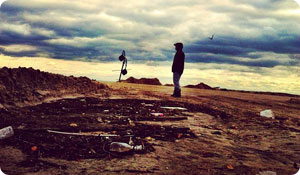
In the aftermath of a violent storm such as Hurricane Sandy, it's more important than ever to remain on full alert. Potential dangers can lurk everywhere from your roof to your kitchen. Here's how to keep yourself and your loved ones safe.
Food Poisoning
Power outages can result in refrigerators and freezers being filled with spoiled food. It's frustrating to lose hundreds of dollars' worth of perishables, but if your freezer has been off for a couple of days and the food is no longer frozen, it should be discarded. And don't think that if the milk in the fridge feels cool, it's okay to drink.
The Plan: Not sure about the food in your fridge? Check the temperature. It should be 40 degrees Fahrenheit or below, according to the USDA. Bottom line? It's not worth the risk, so when in doubt, throw it out. And be sure to listen to advisories in your area about the water supply. If it's been contaminated, you may be instructed to boil it before drinking.
Carbon Monoxide Poisoning
Running a generator inside is a recipe for disaster, says Robert Glatter, MD, an emergency room physician at Lenox Hill Hospital in New York City. "This can result in carbon monoxide toxicity poisoning," he says.
The Plan: "Always run a generator outside, well away from the windows."
Bacterial infections
Sea water can contain a variety of infection-causing organisms, says Glatter. Additionally, stagnant water is a great breeding ground for bacteria. If you re-enter your home to clean up and remove belongings, take extra care if you have any open cuts or previous injuries, Glatter recommends. And never, ever go barefoot when you are in a room that has flooded as you could easily cut your foot and get an infection.
The Plan: Don't dispose of broken glass in regular garbage bags since you can easily get a cut or laceration on your hand, he says. And make sure your family is up to date on tetanus shots. If your children are playing anywhere near stagnant water, make sure they wash their hands thoroughly afterwards.
Asbestos Concerns
When roofs are blown off houses and piping and insulation are exposed, certain health risks go up. "Roofing, insulation, and piping can contain asbestos, and it is not something you can smell or taste,"
Glatter says. "It is not a problem when damp or wet, but it is an issue when it dries out and crumbles into a powder." Asbestos is a known carcinogen, so exercise extreme caution.
The Plan: If you have any asbestos concerns, don't try to handle cleanup and debris removal yourself. Instead, wait until someone trained in handling hazardous debris is available to help, Glatter says. And don't rely on one of the masks that you can pick up in a hardware store as they're not fully effective at keeping away asbestos fibers.
Hypothermia
Those in communities without access to power are at a big risk for hypothermia, especially as temperatures drop. "Confusion is the main presenting symptom," Glatter says. "If you are with someone who is confused or dizzy and has chills and difficulty breathing, call 911."
The Plan: Stay alert. Hypothermia also can mimic strokes and alcohol intoxication, Glatter explains, so closely watch individuals who may be at risk, such as the elderly.
Mental Health Concerns
Since the storm hit, there's been a spike of emergency room visits for anxiety and depression, Glatter says. "The storm has really brought this out in people," he says. "And if you are already at risk for these conditions, having no power and being without a home can make it much worse."
The Plan: If you or a loved one is feeling desperate and anxious, don't try to tough it out. Discuss the feelings with your doctor, and see about getting help from a professional counselor.
Electrocution Risks
Downed power lines don't stop being a concern after the immediate storm passes by. "One of the biggest dangers after a storm is downed wires,"" says Ken Spaeth, MD, MPH, of North Shore LIJ Health System in Great Neck, NY.
The Plan: Don't let your children play outside until it's been confirmed that the area is safe. "Kids need to be educated about dangerous wires and how to avoid them," he adds. "If they see a wire on or near the ground, even after the storm, they need to assume it is live."





